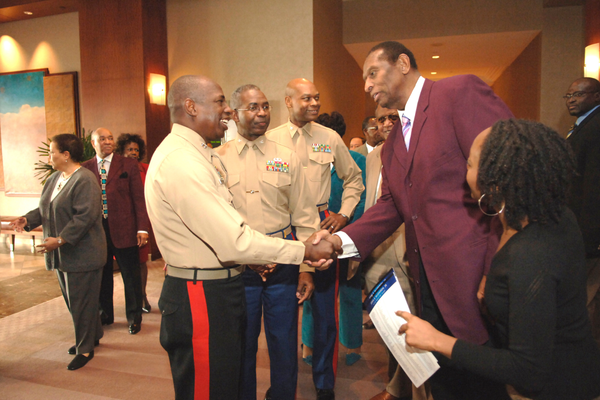

In a league that now celebrates a rich tapestry of talent from all backgrounds, it’s crucial to remember the courageous first steps that paved the way. Earl Lloyd didn’t just step onto an NBA court; he shattered a seemingly impenetrable barrier, becoming the first Black player in the league and forever altering the trajectory of professional basketball.
He changed the game, literally. Earl Lloyd wasn’t just a basketball player; he was a barrier-breaker who redefined what was possible in the NBA. On October 31, 1950, Lloyd became the first African American to play in an NBA game, stepping onto the court for the Washington Capitols.
Surviving peacefully, let alone playing, was not easy in that era. America in the 50’s was a different world altogether. With the great war finally at rest and the world returning to its prior glory, there was very evident racism. And no person of color was spared, not even a professional athlete.
ADVERTISEMENT
Article continues below this ad
Recently, on SiriusXM NBA Radio, while in conversation with @TermineRadio and @JumpShot8, Kevin Lloyd, the son of Earl Lloyd, shared an anecdote of his father’s struggles. He said, “It was tough on him because, of course, there was some hotels they went to that they didn’t care about him being a professional ball player. That he still had to go to the back door, and he couldn’t eat in the main restaurants, and he understood that. But so was it tough? Yeah, it was tough.”
Today, the NBA celebrates the 75th Anniversary since the 1950 Draft that broke the color barrier.
Kenny Lloyd talks w/ @TermineRadio & @JumpShot8 about his father, Earl Lloyd, being the first African American to play in the @NBA
Hear exclusive interviews from the children of… pic.twitter.com/Jidn3ehtkK
— SiriusXM NBA Radio (@SiriusXMNBA) April 25, 2025
Kevin Lloyd is speaking of the time when the colored individuals were not allowed entry in tandem with the others. Adding to that, there was also a segregation in the dining halls with the people of the black community having to dine outside, or separately. Which, considering the time, was a norm. Utterly disgusting subjugation.
However, as Kevin Lloyd stated later, his father took it in stride, saying, “ I really believe that based on what he said, at the end of the day, it’s about talent. If you get on that court and you can play, you’re gonna earn some respect from people. I don’t care what your color is.” reaffirming the point that talent beats race.
Earl Lloyd stayed true to his word. He let his talent speak and performed on the court, eventually winning a championship and changing the entire narrative surrounding black players in the NBA.
What’s your perspective on:
Was Earl Lloyd's impact on the NBA as significant as Jackie Robinson's in baseball?
Have an interesting take?
How Earl Lloyd’s involvement in a championship-winning team changed the perception of black athletes in the NBA
West Virginia State President Brian Hemphill remarked, “When Earl stepped out on the court on that fateful date in 1950, this remarkable man rightfully earned his place in the historic civil rights movement and, more important, he opened the door to equality in America.” And he didn’t just win a championship, he helped change the way the world saw Black athletes.
When Earl Lloyd and his teammate Jim Tucker helped the Syracuse Nationals capture the 1955 NBA title, they became the first African Americans to play on a championship team. That wasn’t just a milestone in sports, it was a moment that shifted how people viewed race, talent, and teamwork on the biggest stage. At a time when Black players were still fighting for acceptance in the league, Lloyd’s success was undeniable proof that they belonged.
Averaging 10.2 points and 7.7 rebounds that season, Lloyd wasn’t just filling a spot, he was making a statement. He showed up, showed out, and showed everyone that Black athletes could thrive under pressure, contribute at the highest level, and play pivotal roles in team success. By 1960, stars like Bill Russell and Elgin Baylor were dominating the NBA, building on the foundation laid by pioneers like Earl Lloyd, as teams slowly began prioritizing talent over race. His performance helped challenge and break down the racist myths that once clouded opportunities for African American players in professional basketball.
But this was bigger than basketball. Lloyd’s title win came during the early stirrings of the Civil Rights Movement, when Black Americans were pushing back against deep-rooted inequality. His success echoed the courage of figures like Jackie Robinson, who broke Major League Baseball’s color barrier in 1947, proving that sports could be a battleground for civil rights and social equality. By becoming a champion in an integrated NBA, Lloyd was rewriting the narrative, proving that talent and teamwork weren’t defined by skin color.
ADVERTISEMENT
Article continues below this ad

ADVERTISEMENT
Article continues below this ad
That win? It was a ripple that became a wave. It opened doors for the future and helped accelerate the NBA’s transformation into one of the most diverse professional sports leagues in the world. Today, with more than 70 percent of NBA players being Black, it’s easy to forget how revolutionary Lloyd’s journey was.
But we shouldn’t. Because every slam dunk, every buzzer-beater, every MVP moment from a Black athlete traces back to pioneers like Earl Lloyd, who didn’t just make history, they made change.
ADVERTISEMENT
ADVERTISEMENT
ADVERTISEMENT
ADVERTISEMENT


Was Earl Lloyd's impact on the NBA as significant as Jackie Robinson's in baseball?